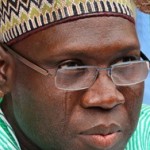Special topics
 The Minister of Lands and Natural Resources,Alhaji Inusah Fuseini, has called on the international business community to invest in Ghana, in view of its attractive investment framework.
The Minister of Lands and Natural Resources,Alhaji Inusah Fuseini, has called on the international business community to invest in Ghana, in view of its attractive investment framework.
He said the country, among other things, had rich natural resources, coupled with geo-scientific data, political and macroeconomic stability and well- ‘ structured institutions that reduced bureaucracy.
The minister was addressing delegates at a ministerial forum on investing in Africa in Cape Town on Wednesday.
The theme of the African Mining and Indaba Conference is: “The challenge of Opportunity of Substantial Development in Mining”.
Mineral resources
Alhaji Fuseini told the delegates that Ghana has gold, diamond, manganese and bauxite and that gold is the predominant mineral being exploited in the country.
Aside those, he said, the country has deposits of _iron ore, columbite-tantalum, limestone, clay, solar salt, silica sand, among others.
“Currently, some of these minerals are being exploited on a smaller and often on artisanal scale. Potential exists for the development of these minerals on a large scale,” he told the delegates.
Ghana’s economy
Alhaji Fuseini said the country has a stable multi¬party democracy, while the prudent management of its economy had resulted in some successes.
He said last year, for instance, the services sector, which is also the largest sector, recorded 9.2 per cent, followed by industry at 9.1 percent.
Mining sector
“Ghana’s favourable investment climate succeeded in attracting significant mining sector investment of some US$13.5 billion over the past two decades,” he said.
He said there are currently 13 operating mines in the country —11 gold mines and one each for bauxite and manganese.
He said the investments had resulted in significant increases in the production of all the major,minerals and that gold production increased by 93 per cent from 2.24 million ounces in 2002 to over 4.3 million ounces in 2012.
Challenges
Alhaji Fuseini noted that the mining industry was faced with challenges globally and especially in Africa where, apart from South Africa, most of the investment came in as foreign direct investment.
He said the key challenge related to issues of tax evasion and avoidance through transfer pricing, profit shifting and many other forms of sophisticated financial manipulation to avoid paying the required taxes to host countries.
Policy initiatives to address challenges
The minister said Ghana had been publishing quarterly reports on the minerals sector long before the global policy of the Extractive Industries Transparency Initiative (EITI) was developed.
He talked about some strategies the government had adopted to improve the operating environment, among which was the inter-ministerial task force, which was complementing the efforts of the regulatory agencies to deal with the menace of illegal mining.
Source: Daily Graphic
Get the latest news and updates on Ghana’s oil and gas value chain by following us Reporting Oil and Gas on twitter @oilgasghana and like our facebook page and get at us on Google+. Subscribe to our group to get update